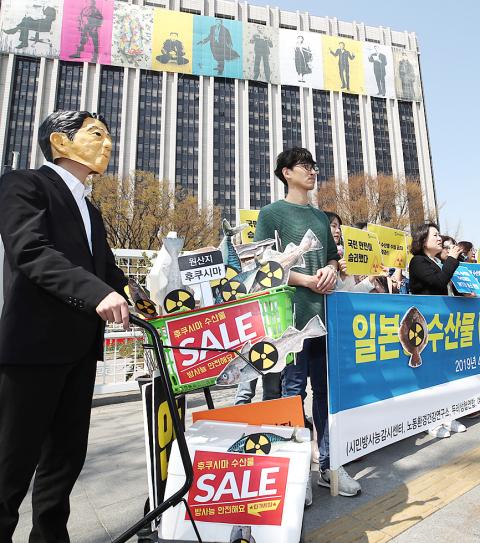Japan yesterday attacked an “extremely regrettable” ruling by the WTO that upheld a ban by South Korea on some seafood from Fukushima imposed after the 2011 nuclear power plant disaster.
The WTO’s highest court overturned an earlier judgement from last year, handing Seoul a final victory in a legal battle that has dragged on for years.
“Even though the ruling did not acknowledge that South Korea’s measures comply with the WTO rules, it is extremely regrettable that Japan’s argument was not approved,” the Japanese Ministry of Foreign Affairs said.

Photo: EPA-EFE
“There is no change in Japan’s position of demanding South Korea lift all the restriction measures, and we will pursue this via talks with South Korea,” the ministry said in a statement.
Japanese Minister of Foreign Affairs Taro Kono urged South Korea to “correct its policy,” but acknowledged that Japan had now run out of legal recourse.
Fearing radioactive contamination, Seoul imposed a partial ban on seafood imports from the region after the 2011 earthquake, tsunami and nuclear meltdown at the Fukushima Dai-ichi plant.
Tokyo first took the row to the WTO in May 2015, requesting consultations — the first step under the WTO’s settlement system.
However, talks broke down, prompting Japan to seek a WTO ruling in August 2015.
The WTO panel last year ruled that South Korea should lift its ban, but the appellate court quashed this, the final word on the subject.
According to Fukushima authorities, four countries and regions — China, Hong Kong, Taiwan and Macau — have maintained a ban on importing a broad range of locally produced foods.
South Korea, Singapore, the US and the Philippines have partial bans in place, but the majority of other countries and regions — including the EU — have lifted bans on imports or allow imports on condition that a certificate of inspection is attached.

To many, Tatu City on the outskirts of Nairobi looks like a success. The first city entirely built by a private company to be operational in east Africa, with about 25,000 people living and working there, it accounts for about two-thirds of all foreign investment in Kenya. Its low-tax status has attracted more than 100 businesses including Heineken, coffee brand Dormans, and the biggest call-center and cold-chain transport firms in the region. However, to some local politicians, Tatu City has looked more like a target for extortion. A parade of governors have demanded land worth millions of dollars in exchange

Hong Kong authorities ramped up sales of the local dollar as the greenback’s slide threatened the foreign-exchange peg. The Hong Kong Monetary Authority (HKMA) sold a record HK$60.5 billion (US$7.8 billion) of the city’s currency, according to an alert sent on its Bloomberg page yesterday in Asia, after it tested the upper end of its trading band. That added to the HK$56.1 billion of sales versus the greenback since Friday. The rapid intervention signals efforts from the city’s authorities to limit the local currency’s moves within its HK$7.75 to HK$7.85 per US dollar trading band. Heavy sales of the local dollar by

Taiwan Semiconductor Manufacturing Co’s (TSMC, 台積電) revenue jumped 48 percent last month, underscoring how electronics firms scrambled to acquire essential components before global tariffs took effect. The main chipmaker for Apple Inc and Nvidia Corp reported monthly sales of NT$349.6 billion (US$11.6 billion). That compares with the average analysts’ estimate for a 38 percent rise in second-quarter revenue. US President Donald Trump’s trade war is prompting economists to retool GDP forecasts worldwide, casting doubt over the outlook for everything from iPhone demand to computing and datacenter construction. However, TSMC — a barometer for global tech spending given its central role in the

The Financial Supervisory Commission (FSC) yesterday met with some of the nation’s largest insurance companies as a skyrocketing New Taiwan dollar piles pressure on their hundreds of billions of dollars in US bond investments. The commission has asked some life insurance firms, among the biggest Asian holders of US debt, to discuss how the rapidly strengthening NT dollar has impacted their operations, people familiar with the matter said. The meeting took place as the NT dollar jumped as much as 5 percent yesterday, its biggest intraday gain in more than three decades. The local currency surged as exporters rushed to